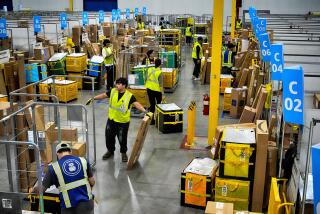Productivity Drop Steepest in Four Years : Analysts Say 1.3% Fall in Quarter May Signal New Inflation
WASHINGTON — Productivity, the efficiency with which the nation produces goods and services, dropped at an annual rate of 1.3% in the last quarter of 1985, the sharpest decline in four years, the government said Wednesday.
Excluding farming, the productivity drop was at an even greater rate--1.8%, the Labor Department said.
The downturn was seen by analysts as a reflection of the slowdown in economic growth last year and as a possible forewarning of a long-term return to higher inflation rates.
The last time there was a sharper quarterly drop was the fourth quarter of 1981, when productivity fell at a 5.3% annual pace.
The Bureau of Labor Statistics said the sharp decline in productivity reflected a 3.9% increase in the number of hours worked to achieve a 2.5% higher output in goods and services. Productivity in the third quarter had risen at a 1.9% annual rate.
Small Growth for Year
For the year as a whole, productivity grew a negligible 0.3%, compared to a 2.1% increase in 1984, the bureau said.
Per-unit labor costs--about 75% of the cost of goods and services--increased 5.5% the last three months of 1985, the largest advance since the fall of 1982, the government said.
Allen Sinai, chief economist for Shearson Lehman Bros. in New York, called the figures “quite disappointing . . . with regard to the inflation outlook.”
Sinai said his firm still predicts that inflation, as measured by the consumer price index, will remain in the 3.8% to 4% range of the past four years, chiefly because of declines in oil prices.
But he said the report Wednesday raises “a caution flag on that optimism. If we see another report or two with these kinds of results, the outlook for inflation will not be so sanguine.”
Michael Evans, president of Evans Economics, a Washington-based economic consulting firm, said recent sharp drops in oil prices have postponed the inflationary effects of declining productivity.
Plunge Delayed Impact
“If it hadn’t been for this recent plunge in oil prices, we might have already felt an inflation impact,” Evans said. “But you can’t keep pulling rabbits out of the hat like that.”
Earlier this week, the government reported a 3.8% increase in the consumer price index, the most widely accepted measure of inflation, for 1985. That compared to a 4% rate of inflation in 1984.
The government also reported that economic growth for the year, as measured by the gross national product, fell to 2.3%, down from the 6.6% growth rate of 1984 and well below the 5.3% growth predicted by the Reagan Administration.
As a further indication of the slower growth, the Bureau of Labor Statistics said Wednesday that the 2.9% increase in employment in 1985 “was a good deal smaller” than the 5.1% increase in the previous year.
More to Read
Inside the business of entertainment
The Wide Shot brings you news, analysis and insights on everything from streaming wars to production — and what it all means for the future.
You may occasionally receive promotional content from the Los Angeles Times.










